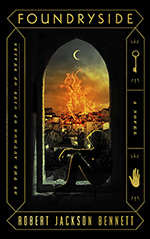
![]() Arifel
Arifel
8/31/2018
![]()
Rarely does a book instil such a sense of excitement in me as the first ten percent of Foundryside, the first in a new trilogy by Robert Jackson Bennett. The book wastes no time throwing us right into the action with Sancia, a mysterious thief in the middle of a job that appears to be going terribly wrong. Sure enough, within pages, Sancia has accidentally burned down the docks of Tevanne and has most of the city's authorities out looking for her. More importantly, however, she has discovered that the mysterious object she has been asked to locate is a magical key that can open any lock, and which she is able to have direct conversations with thanks to her own mysterious and unique abilities. By the time Sancia and her buddy Clef (who is a boy key, a fact which is actually questioned and has an in-universe justification beyond "of course this inanimate object is of the default gender!") are making their way through magical doors that <SPEAK IN OSTENTATIOUS CAPITALS ABOUT THEIR LIFE MISSIONS>, I was absolutely hooked, and while Foundryside certainly gets darker from this point, I never lost sight of that initial hit of wonder from the world Bennett has developed.
If magical talking keys sound a bit too whimsical for your tastes, I encourage you to stick with Foundryside anyway, because this is not a world that runs on fairytale logic. Instead, we are shown a magic system whose rules work basically like a programming language, in which objects can be "convinced" to bend or alter the rules of reality -- gravity being the most common example, though there are plenty of others. The developers of this system are basically inventors and coders, sponsored by the city's handful of powerful merchant families to conduct R&D and help them maintain technological advantages, and this reliance on centrally-controlled innovation has led to the concentration of wealth and power within these families, who run "campos" where those who work for them live and work in relative comfort while the rest of the city is left to fend for itself. The technology levels in Foundryside encourage historical comparison, bringing to my mind both the period of industrialisation in Europe and a more Renaissance element of "rediscovering" technology from a far removed foreign age. In terms of political dynamics, however, there's just as much here that is relevant to the modern day, where public welfare is increasingly at the mercy of extraordinarily wealthy innovators. The city of Tevanne, where the action happens, doesn't appear to have any concept of charitable giving whatsoever, and the Commons are shown as dangerous and lawless slums which families ignore unless absolutely necessary, while those inside the campos are still dependent on the success and whims of their employers for all their needs. It's a system utterly rife with exploitation, inefficiency and a complete lack of interest in human wellbeing, and it's this background obviously has a huge impact on how the main story of Foundryside plays out.
Full review at: http://www.nerds-feather.com/2018/08/microreview-book-foundryside-by-robert.html
http://www.nerds-feather.com/2018/08/microreview-book-foundryside-by-robert.html